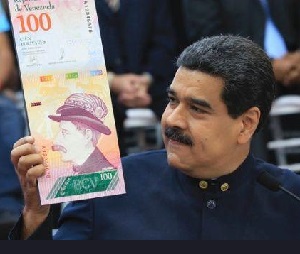 The process of monetary reconversion in Venezuela is now a reality. Being implemented gradually as the Economic Cabinet adjusted details related to its entrance into effect, it will lay the basis for the Economic Recovery, Growth, and Prosperity Program that will dismantle the neoliberal capitalism which some have hoped to impose on the country.
The process of monetary reconversion in Venezuela is now a reality. Being implemented gradually as the Economic Cabinet adjusted details related to its entrance into effect, it will lay the basis for the Economic Recovery, Growth, and Prosperity Program that will dismantle the neoliberal capitalism which some have hoped to impose on the country.
The President assured on his Twitter account, this past August 20, that this step represents “a turning point” for Venezuela, adding, “We are going to dismantle neoliberal capitalism’s perverse war and install a virtuous, balanced, healthy, and productive economy.”
Granma approaches several aspects that allow us to understand the process:
What are the objectives of the reconversion?
This monetary policy involves the taking of corrective action to address factors that distort the economy, like inflation, monetary liquidity, the reduction of buying power, and others, allowing for the creation of conditions to reduce vulnerability to elements that destabilize a nation’s economy.
Thus the currency is transformed to a new scale, with fewer zeroes, without losing buying power.
According to the Venezuelan President, this process will contribute to defending the national currency from financial attacks perpetuated by pro-imperialist sectors.
What is the Bolívar Soberano and what is its relation to the petro?
Spearheading the process is beginning circulation of the Bolívar Soberano (Bs.S.) and the creation of a new monetary cone which includes a new series of five cent and one bolivar coins, as well as bills in the denominations of 2, 5, 10, 20, 50, 100, 200, and 500 bolivars.
The Bs.S. has five fewer zeroes as compared to the bolivar, with which it will coexist to provide change and conduct small transactions. The Bs.S. is anchored to the Petro, that is, backed by the country’s oil deposits. According to the announcement, the new bills (2, 5, 10, 20, 50, 100, 200, and 500) are in the hands of public and private banks.
Thus, the supply of Bs.S. in circulation is subject to the volume of petros available and will act as a conversion till, linked to the supply or price of Venezuelan oil. Every unit of the cryptocurrency is equivalent to 3,600 Bs.S. and will be the referent used to set wages and prices of consumer goods and services, as one of the accounting units that will be utilized in the Bolivarian nation.
Prior to the beginning of the process, authorities at the Central Bank of Venezuela assured delivery and safeguarding of the new bills in the country’s banks, and reiterated that new and old bills will coexist until to further notice, as the latter gradually disappear.
The existence of a new monetary cone will allow for progress in addressing the shortage of cash in Venezuela – above all a result of contraband activities extracting bills to countries like Colombia – which has led to the posting of two prices in many stores: one for electronic transactions and another for paper money.
What other measures support the reconversion?
A new system of fair prices was announced August 21, to ensure that Venezuelans basic basket of food items be priced below half a petro, a formula described by President Maduro as “revolutionary,” putting work at the center the general re-balancing of society, in addition to the production of goods and salary compensation.
“With this we will put a definitive end to the perverse model that dollarized prices in the country,” he emphasized.
Additionally planned as part of the reconversion is a new design of fiscal and tax policies; a new gasoline subsidy policy; a four percent increase in value-added taxes; and the establishment of a single rate of currency exchange, which will fluctuate as regulated by the Central Bank
The President called on the people to defend the stability of prices on the street “with consciousness,” and, on his official Facebook page, expressed his gratitude for the people’s support and untiring work that allowed the monetary and economic reconversion to be carried out.
At the end of the first day of the process, Executive Vice President Delcy Rodríguez reported on Venezuelan Television Channel 8 that shortly after the opening of the electronic banking platform, where transactions with the Bolivar Soberano are managed, some 400,000 operations at different points had already been completed. “The Recovery Program is the way to win the war,” she reiterated.
(Granma)